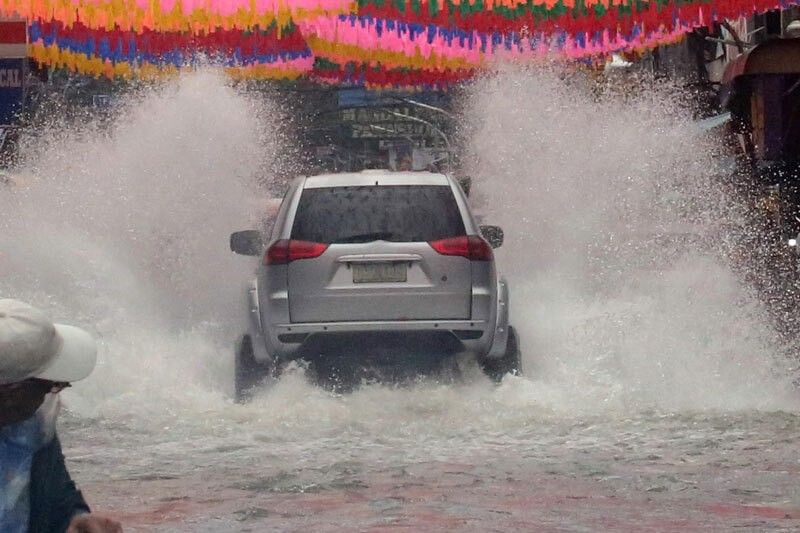
Upgrade to High-Speed Internet for only ₱1499/month!
Enjoy up to 100 Mbps fiber broadband, perfect for browsing, streaming, and gaming.
Visit Suniway.ph to learn
Janvic Mateo - The Philippine Star
July 24, 2025 | 12:00am
MANILA, Philippines — As part of efforts to boost flood-control measures and address long-neglected river maintenance, the Department of Public Works and Highways (DPWH) will take over dredging and desilting operations nationwide instead of outsourcing them to contractors.
“I think one of the problems we’re facing right now is actually the very shallow riverbeds. For the longest time – for many, many years – there hasn’t been much desilting and dredging of rivers in the country,” Public Works Secretary Manny Bonoan said in an interview with “Storycon” on One News yesterday.
“We plan to undertake the dredging of rivers so the carrying capacity will be more efficient,” he added.
Asked about concerns over the difficulty in auditing dredging projects, Bonoan said they plan to capacitate DPWH personnel to handle the work internally.
“What seems to be the problem before is when it is done by contract… But we can do it ourselves. We’ll be auditing our people if the work has been done properly,” he said.
“We will acquire our equipment. Our people will do it ourselves… It’s the department itself, the people in the department who will do the dredging,” the DPWH chief added.
Bonoan said they will again request Congress to include funds in the 2026 budget to purchase dredging equipment, but noted the program will start ahead of that allocation as part of major flood-control initiatives.
“Everybody is concerned about flooding … All we have to do is to convince them that our approach has to be all integrated and holistic. This is what we’re trying to do in many parts of the country now,” he said, referring to politicians.
Alongside dredging, the DPWH is also revising its design protocols for flood control projects, moving away from the old 25-year return period to a 50- to 100-year return period, as ordered by President Marcos.
He explained that the changes are necessary due to more intense and frequent rainfall events.
Bonoan also stressed the urgency of clearing Metro Manila’s “very old” drainage systems, which he said are about 70 percent clogged with silt, preventing floodwaters from flowing efficiently toward Laguna Lake or Manila Bay.
“We have to focus our attention on this,” he said. “Especially here in our urban areas, and in other urban areas all over the country.”
He added that upgrading existing pumping stations and building bigger drainage systems are crucial to increasing the discharge capacity of waterways.
“Even if our pumping stations are efficient, if the conveyance systems are not, then it will not be very efficient,” Bonoan said.
Currently, the DPWH is upgrading 35 pumping stations in Metro Manila to improve discharge capabilities, while also integrating water impounding projects into flood-control programs.
Catchment systems pushed
In the House of Representatives, two lawmakers called for proactive flood-mitigation measures, including a nationwide catchment system and stricter enforcement of anti-littering laws.
“It’s time to stop reacting and start preparing. We must build localized water catchment systems not only for irrigation and food security but also to protect lives and homes from relentless flooding,” Rep. Robert Nazal said of House Bill 830.
“Every drop we harvest is a flood we prevent,” the Bagong Henerasyon party-list lawmaker added, explaining that the proposal promotes the construction of farm-level water catchment systems across the country.
Nazal said dams alone cannot handle the country’s water needs and that smaller retention systems are necessary to reduce flooding and improve water storage for irrigation.
The bill also proposes incentives such as tax exemptions, concessional financing, and technical support for communities that adopt the system.
Rep. Jay Khonghun of Zambales, meanwhile, called for a crackdown on environmental violators, citing garbage dumping as a major cause of clogged drainage systems.
“There’s always massive flooding every time we have a heavy downpour. Drainages are clogged and the garbage we throw everywhere comes back to us. This is an effect of our failure to segregate waste,” Khonghun said.
He urged all local government units to strengthen enforcement of environmental protection measures and instill discipline among residents.
“It is our shared responsibility with the government, from the local to the national level, that we help each other in properly disposing of our garbage, so that we can help our fellow Filipinos have a clean and green environment that is totally free of floodwaters,” he said.
Pols’ interference
At the Senate, Sen. Erwin Tulfo called for an overhaul of flood control management and warned against political interference in project implementation.
“It is not our job, our job is to make laws. Why should we meddle with flood control? Several administrations have focused on flood control, has anything happened?” Tulfo said in Filipino during relief operations in Quezon City.
He said flood control projects should be handled solely by national agencies like the DPWH, not politicians.
“We must make sure that the national government implements flood control projects, not politicians. Not congressmen, not senators, but the Department of Public Works and Highways, the national government,” he stressed. - Delon Porcalla, Bella Cariaso, Rainier Allan Ronda, Neil Jayson Servallos

 1 day ago
5
1 day ago
5



